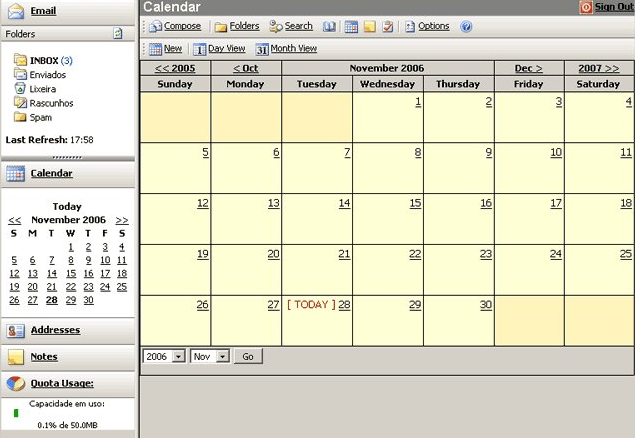
- SQUIRRELMAIL 1.4.19 EXPLOIT FULL
- SQUIRRELMAIL 1.4.19 EXPLOIT SOFTWARE
- SQUIRRELMAIL 1.4.19 EXPLOIT CODE
- SQUIRRELMAIL 1.4.19 EXPLOIT PASSWORD
This could lead to XML External Entity (XXE) attacks in Apache Commons Jelly before 1.0.1.
SQUIRRELMAIL 1.4.19 EXPLOIT PASSWORD
The WS-SP UsernameToken policy in Apache CXF 2.4.5 and 2.5.1 allows remote attackers to bypass authentication by sending an empty UsernameToken as part of a SOAP request.ģ89-ds-base version before 1.3.5.19 and 1.3.6.7 are vulnerable to password brute-force attacks during account lockout due to different return codes returned on password attempts.ĭuring Jelly (xml) file parsing with Apache Xerces, if a custom doctype entity is declared with a "SYSTEM" entity with a URL and that entity is used in the body of the Jelly file, during parser instantiation the parser will attempt to connect to said URL.

The error is in the save_abbr function in time_rz.c.ģ89 Directory Server in Red Hat Enterprise Linux Desktop 6 through 7, Red Hat Enterprise Linux HPC Node 6 through 7, Red Hat Enterprise Linux Server 6 through 7, and Red Hat Enterprise Linux Workstation 6 through 7 allows remote attackers to obtain user passwords.

Gnulib before has a heap-based buffer overflow with the TZ environment variable.
SQUIRRELMAIL 1.4.19 EXPLOIT CODE
Multiple integer overflows in the (1) vnc_connection_server_message and (2) vnc_color_map_set functions in gtk-vnc before 0.7.0 allow remote servers to cause a denial of service (crash) or possibly execute arbitrary code via vectors involving SetColorMapEntries, which triggers a buffer overflow. NOTE: this vulnerability exists because of an incomplete fix for CVE-2016-3737. The server in Red Hat JBoss Operations Network (JON), when SSL authentication is not configured for JON server / agent communication, allows remote attackers to execute arbitrary code via a crafted HTTP request, related to message deserialization. Integer overflow in the MDC2_Update function in crypto/mdc2/mdc2dgst.c in OpenSSL before 1.1.0 allows remote attackers to cause a denial of service (out-of-bounds write and application crash) or possibly have unspecified other impact via unknown vectors. Libvirt before 2.0.0 improperly disables password checking when the password on a VNC server is set to an empty string, which allows remote attackers to bypass authentication and establish a VNC session by connecting to the server. The smartcard interaction in SPICE allows remote attackers to cause a denial of service (QEMU-KVM process crash) or possibly execute arbitrary code via vectors related to connecting to a guest VM, which triggers a heap-based buffer overflow.įormat string vulnerability in libxml2 before 2.9.4 allows attackers to have unspecified impact via format string specifiers in unknown vectors. Openshift allows remote attackers to gain privileges by updating a build configuration that was created with an allowed type to a type that is not allowed.Įxpat allows context-dependent attackers to cause a denial of service (crash) or possibly execute arbitrary code via a malformed input document, which triggers a buffer overflow.
SQUIRRELMAIL 1.4.19 EXPLOIT SOFTWARE
Note: Software versions which have reached End of Technical Support (EoTS) are not evaluated. In appliance mode BIG-IP, a successful exploit of this vulnerability can allow the attacker to cross a security boundary. In BIG-IP starting in versions 17.0.0, 16.1.2.2, 15.1.5.1, 14.1.4.6, and 13.1.5 on their respective branches, a format string vulnerability exists in iControl SOAP that allows an authenticated attacker to crash the iControl SOAP CGI process or, potentially execute arbitrary code. The following methods below have been tested and validated by a 3rd party analyst and has been confirmed exploitable special thanks to Rustam Amin for providing the steps to reproduce. Commands are executed using pre-login execution and executed with root permissions.
SQUIRRELMAIL 1.4.19 EXPLOIT FULL
In OpenBMC 2.9, crafted IPMI messages allow an attacker to bypass authentication and gain full control of the system.īaicells Nova 436Q, Nova 430E, Nova 430I, and Neutrino 430 LTE TDD eNodeB devices with firmware through QRTB 2.12.7 are vulnerable to remote shell code exploitation via HTTP command injections. Anyone able to make a TCP connection to any compute host IP address, including 127.0.0.1, other loopback interface addresses, or in some cases possibly addresses that have been exposed beyond the management interface, could use this to open a virsh session to the libvirtd instance and gain control of virtual machine instances or possibly take over the host.

Libvirtd is deployed by default (by director) listening on 0.0.0.0 (all interfaces) with no-authentication or encryption.

A design flaw issue was found in the Red Hat OpenStack Platform director use of TripleO to enable libvirtd based live-migration.


 0 kommentar(er)
0 kommentar(er)
